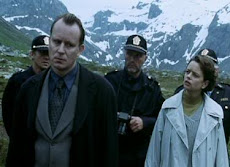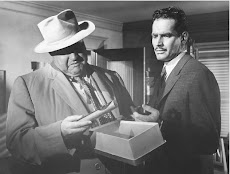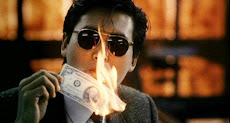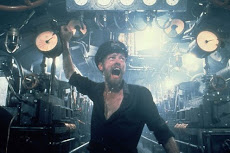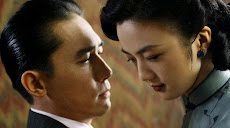The best horror films are often classified as dramas. So it is for the first two of my top three: (1) The Vanishing; (2) No Country for Old Men, and (3) Manhunter / Red Dragon. Number 3 is getting a future post all to itself, but for now I'll simply say that I enjoy the original and the remake equally. These films scare me far more than even The Excorcist.
The world was not an evil place until man made it so. The scariest stories for me are not simply terrible things happening to good people for superficial evil reasons (e.g., coeds visiting Camp Crystal Lake are dismembered by a vengeful Jason who's upset over his drowning (or something like it) 20 years prior), but those that focus on characters so consumed by evil it seems they are beyond redemption. Of course, no one is beyond redemption, but in absence of a miracle these people will do a lot of damage. Often, they are unstoppable.
So it goes in all three films: corresponding to the list above, the characters (1) Raymond Lemorne, (2) Anton Chigurh and (3) Francis Dolarhyde are my most horrifying villains, and I pray I never encounter such filth in real life. While these villains hold the upper hand throughout their stories (2/3, anyway), I walk away not depressed but with a new determination to not succumb to such a path and, more importantly, to fight evil, even to the bitterest end. I credit their stories for not pulling any punches; the "smartest" of these men may claim to be beyond good and evil, but there's no question that their claims are meritless.
(Digression: viewing the finale of Fritz Lang's M through a modern lens gives many viewers a sympathetic view of a child murderer as he claims he cannot control his compulsions. I believe in 1931, however, the typical viewer found this claim as horrifying as the man himself. Oh, how far we've advanced. I think removing a "presentist" worldview also makes for better interpretation of the closing to Kurosawa's High and Low (1963).)
 Alas, the modern horror genre is preoccupied with giving Nietzsche a soapbox. While typical slasher flicks (going back to the original Black Christmas) focus more on the evil acts themselves than the actor, one recent series is utterly fascinated with its killer and his motives. That is, Jigsaw in the Saw series.
Alas, the modern horror genre is preoccupied with giving Nietzsche a soapbox. While typical slasher flicks (going back to the original Black Christmas) focus more on the evil acts themselves than the actor, one recent series is utterly fascinated with its killer and his motives. That is, Jigsaw in the Saw series.I don't know how Saw II, III, IV, and V turned out. One was enough for me. I apologize for any inaccuracies that may result from this post; I will not be watching Saw again and must recall the theatrical showing from 2004.
Jigsaw is a creepy McGee (though I make no claims that he is of Irish descent). He finds people with problems in their lives (everything from adulterers to drug addicts to tax evaders), kidnaps them and then sets them up in elaborate death traps from which they can try to escape. Escape, however, requires some sort of sacrifice. Dr. Lawrence Gordon, played by the formidable Cary Elwes (okay, "formidable" is a stretch, but I like Robin Hood: Men in Tights), is confronted with the prospect of sawing off his own arm and murdering a fellow captive in order to survive.
I have no recollection how it turns out. This event, however, paired with flashbacks to Jigsaw's past shenanigans, shows an overall pattern that Jigsaw is not only testing each victim's sacrificial will, but providing them a grotesque opportunity to remove the respective monkeys from their backs. The only documented survivor of Jigsaw's antics is a young reformed drug addict, who ripped open a man's gullet (thereby killing him) to find the key to unlock the trap clasped around her neck. Now off the crank, she murmurs, "he helped me."
I have no recollection how it turns out. This event, however, paired with flashbacks to Jigsaw's past shenanigans, shows an overall pattern that Jigsaw is not only testing each victim's sacrificial will, but providing them a grotesque opportunity to remove the respective monkeys from their backs. The only documented survivor of Jigsaw's antics is a young reformed drug addict, who ripped open a man's gullet (thereby killing him) to find the key to unlock the trap clasped around her neck. Now off the crank, she murmurs, "he helped me."
Does Jigsaw commit terrible misdeeds for the right reasons? Is he merely misguided? Does the fact that our lone survivor will never again touch the needle somehow mitigate Jigsaw using her as a tool for murder? Of course not. Such low-ball ethical dilemmas don't frighten the objective viewer. Jigsaw's not merely evil, he's also... an idiot. Oooo, scary!
What's most unfortunate about these splatterfests pretending to contribute to a discussion is that they overshadow films that have something to offer. Sure, not everyone's sharp enough to appreciate great films, but putting trash like Saw (and its numerically impressive barrage of yearly sequels) out there doesn't improve their chances of stepping into the light.

There are certain "scared straight" hypotheticals raised in films that actually do cause the viewer to work the brain. For me, one of the best such films is One Hour Photo. I've lamented elsewhere that Robin Williams's performance went largely unnoticed because of his great performance in an otherwise mediocre remake that year, Insomnia. Unlike Insomnia, One Hour Photo is worth seeing and reviewing. Sy Parrish is a man who commits a terrible crime, though not so terrible as to make us fear him. He's not a sick curiosity; he's a troubled man whose action, while not drawing our support, does rouse our sympathy. Rightfully so, I daresay. If you missed it, I highly recommend it.
Perhaps since "horror" films are teenage fare they demand a lower standard, but I pay this demand no mind. Even if getting the "drama" label, a properly executed horror film can open the mind and spirit to serious contemplation. Some directors opt to lace their films with pseudo-intellectual nonsense, but they're better off keeping it brainless; nothing's worse that convincing a dumb kid that he's really thinking about something.
What's most unfortunate about these splatterfests pretending to contribute to a discussion is that they overshadow films that have something to offer. Sure, not everyone's sharp enough to appreciate great films, but putting trash like Saw (and its numerically impressive barrage of yearly sequels) out there doesn't improve their chances of stepping into the light.

There are certain "scared straight" hypotheticals raised in films that actually do cause the viewer to work the brain. For me, one of the best such films is One Hour Photo. I've lamented elsewhere that Robin Williams's performance went largely unnoticed because of his great performance in an otherwise mediocre remake that year, Insomnia. Unlike Insomnia, One Hour Photo is worth seeing and reviewing. Sy Parrish is a man who commits a terrible crime, though not so terrible as to make us fear him. He's not a sick curiosity; he's a troubled man whose action, while not drawing our support, does rouse our sympathy. Rightfully so, I daresay. If you missed it, I highly recommend it.
Perhaps since "horror" films are teenage fare they demand a lower standard, but I pay this demand no mind. Even if getting the "drama" label, a properly executed horror film can open the mind and spirit to serious contemplation. Some directors opt to lace their films with pseudo-intellectual nonsense, but they're better off keeping it brainless; nothing's worse that convincing a dumb kid that he's really thinking about something.


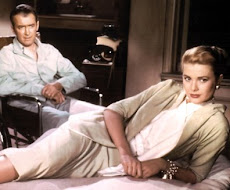_01.jpg)






